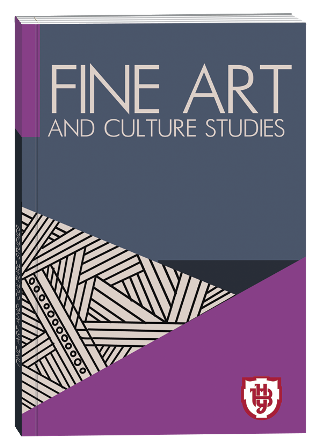INNOVATIVE DIRECTIONS OF FORMATION OF SINGING CULTURE
DOI:
https://doi.org/10.32782/facs-2023-1-3Keywords:
future teachers of musical art, innovative directions, singing abilities, basics of vocal culture, vocal techniques, scientific and methodical literatureAbstract
The recommendations of the systematic use of innovative directions for the development of the singing voice of future art teachers in the modern practice of training in higher education institutions are highlighted. The article contains advice to teachers on the application of innovative scientific and methodological principles in practical work on the development of the singing voice of students of music education. The specificity of the pedagogical direction of vocal training in higher educational institutions requires the formation of a high level of development of the vocal and technical complex of abilities and skills, awareness of the regularities of the process of voice formation, development of vocal and auditory skills, possession of a scientific and theoretical knowledge base on the problems of the development of a music teacher. Significant growth of interest in vocal art in various spheres of human activity and, in particular, mass distribution of various "fashionable" show-programs. art workshops, competitions, go-karting, creative projects, etc., testify to the lack of a professional approach to the qualified training of vocal and pedagogical staff capable of meeting today's needs. The results of the pedagogical experiment give every reason to assert that the proposed changes in the preparation of future music teachers for professional activities under the conditions of ethno-cultural diversity of modern society contribute to increasing the effectiveness of the specified process. The scientific and methodological principles of the development of the singing voice of vocalists are common to the training of specialists in various fields. The process of preparing future teachers-musicians for vocal-pedagogical activity requires a clear understanding of the importance of the influence of the teacher's personality on the formation of the musical culture of the students, his pedagogical competence and the level of professional training. Perfect command of the teacher's singing voice, a wide palette of means of conveying the content of a vocal work is a necessary condition for attracting applicants to the world of musical art. The development of the singing voice requires a clear strategy and tactics of pedagogical activity. Assimilation of the necessary amount of information, mastering of practical skills and abilities requires the organization of educational activities, the creation of teaching methods for a specific discipline. The pedagogical dictionary gives the following definition of the "methodology" of a subject. The general pedagogical concept "methodology" means a set of teaching methods and the science of teaching methods. Scientists single out three tasks of the methodology: studying the content of education, the teaching process, and the learning process. Methodology, as a branch of pedagogical sciences, is most closely related to the practice of the learning process, as it determines the content, methods, techniques and means of learning.
References
Антонюк, В. Г., (2000). Постановка голосу: навчальний посібник для студентів вищих муз. закладів. Київ: Українська ідея, 68 с.
Азарова Л. Є., (2018). Українська мова професійного спілкування. Практичний курс [Текст]. Частина І. Вінниця : ВНТУ, 126 с.
Бриліна В. Л., (2015). Педагогічне значення вокального фольклору в музично-естетичному вихованні, бібліографічний опис для цитування, Київ, 77 с.
Бриліна В. Л., Ставінська Л. М. (2015). Вокальна професійна підготовка вчителя музики, мет.посібник, Киів, Нова книга, 96 с.
Василенко Л. М., (2003). Взаємодія вокального і методичного компонентів у процесі професійної підготовки майбутнього вчителя музики. (Дис. канд. пед. наук). Національний педагогічний університет імені М. П. Драгоманова. Київ, 211 с.
Гончаренко С. У. (1997). Український педагогічний словник, Київ, 206 с.
Гавриленко, Л. М., (2005). Психологічний фактор як домінуючий у процесі вокального виховання дитини. Теоретичні та практичні питання культурології. Зб. наук. праць НМАУ, Мелітопольський держ. педаг. Університет, Сана, С. 86–92.
Гавриленко, Л. М., (2008). Педагогічні умови формування основ вокальної культури учнів молодшого віку. Зб. наук. праць, Кам’янець-Поділ. Нац.. ун-т ім. І. Огієнка. Серія педагогічна. Кам’янець-Подільський: ПП Мошак М.І., вип. XIX. С. 126–129.
Гавриленко Л. М. (2010). Формування основ вокальної культури молодших школярів. (Дис. канд. пед. наук). Національний педагогічний університет імені М. П. Драгоманова. Київ, 211 с.
Гребенюк, Н. Є., (1999). Вокально-виконавська творчість: психолого-педагогічний та мистецтвознавчий аспекти. [Монографія ]. Наукова праця. Київ: НМАУ ім. П.І.Чайковського, 269 с.
Данильчук О. Я. (2019). Актуальність фонетичного методу в процесі виховання співака виконавця. Збірник журнала Мистецтво “Молодий вчений” №10. Прикарпатський національний університет ім. В. Стефаника. Івано-Франківськ, 77 с.
Мадишева Т. П. (2002). Співак і мова : культура співу мовою оригіналу: теорія та практика: навч. посіб. для студ. вокал. ф-тів ВНЗ культури і мистецтва України. Харків : Штріх, 160 с.
Матвєєва О. В. (2006). Сценічне хвилювання як детермінанта вокально-виконавської надійності майбутніх учителів музики. Наука і сучасність: зб. наук. праць Національного педагогічного університету імені М.П. Драгоманова. Київ, С. 64–71.
Матвєєва О. В. (2010). Методика формування вокально-виконавської надійності у майбутніх учителів музики Дис. на здобуття наукового ступеня канд пед. наук. Київ.
Олексюк О. М. (2006). Музична педагогіка. Навч. посібник. Київ: КНУКІМ, 188 с.
Падалка Г. М. (2008). Педагогіка мистецтва: теорія і методика викладання мистецьких дисциплін. Монографія. Київ : Освіта України, 272 с.
Пономарьова Г. Ф. (2010). Теоретико-методичні засади оцінювання професійної компетентності учителів: монографія А. А. Харківська, Т. В. Отрошко. Харків : ХГПА, 180 с.
Ройченко І. В. (2016). Використання фольклору на уроках музичного мистецтва в початкових класах. Вінниця: ММК, 54 с.
Стасько Г. Є. (2019). Основи технології звукоутворення в сучасній практиці виховання голосу. Прикарпатський національний університет ім. В. Стефаника. Івано-Франківськ, 100 с.
Юцевич Ю. Є. (2003). Музика. Словник-довідник / Ю. Є. Юцевич. – 2-ге вид. – Тернопіль : Навчальна книга – Богдан, 352 с.
Юцевич Ю. Є. (1988). Програма з вокального класу Програма педагогічних інститутів. Київ : РУМК, 20 с.
Юцевич Ю. Є. (2005). Теорія і методика розвитку співацького голосу : навч.-метод. посіб. для викладачів і студентів мистецьких навчальних закладів, учителів шкіл різного типу. Київ: ІЗМН, 160 с.







